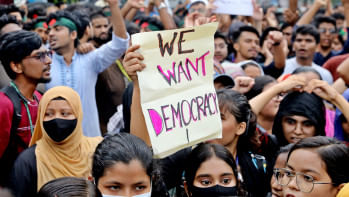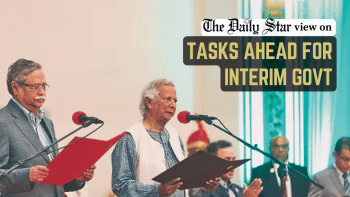The tall task of fixing Bangladesh

In the wake of the Sheikh Hasina-led government's 15-year reign of terror, there are possibly countless acts of corruption and crimes that have accumulated during this period. We have heard of depleting foreign exchange reserves and felt the impact of economic mismanagement on our pockets. However, the actual scale of these problems is likely much worse and waiting to be uncovered.
As a journalist working in the newsroom for the past year, I believe our economic situation is much more dire than any former Awami League leaders have made apparent to us.
Simultaneously, this mass uprising has clearly demonstrated that the general populace has lost its faith in the country's existing political system. Whether you look at social media or speak to people on the streets, a common consensus is that nobody wants the same old political parties to take charge. Both the Awami League and BNP have held power at certain points over the last two decades, and both have failed to demonstrate that they can run the country free of corruption. From that perspective, the existing political scene does not serve a diverse enough platter for the masses.
With that in mind, we must ask ourselves the quintessential question: are three months enough to hold a free and fair election? Because that is not the only concern at hand.
There is the task of restoring democracy and ensuring no party can consolidate power in the same way the previous government did. These are not mere feats that can be accomplished in months, let alone years.
Not to mention that laws like the Cyber Security Act (CSA) need to be completely amended so that no future government can use it to crack down on free speech, dissent, and political opponents.
But can we trust another politically affiliated party to handle these tasks fairly and freely?
No. Under no circumstances should we expect any party, regardless of how much goodwill they can garner, to handle these tasks justly. Call it panic or PTSD, but the Hasina government has clearly demonstrated that the government can tie your tongue, kidnap you, then even shoot you and get away with it if it can just make the right alliances with the right parties. It can even put its own people in politically independent parts of the state.
So, with all these options for creating another authoritarian state still in place, we cannot allow another domineering political party to come in power. As a journalist who has only now been able to speak freely without fear, I believe it is of utmost importance that we not leave even the slightest opportunity for another authoritarian leader to take Hasina's place.
The focus of the protests—an absence of democracy, corruption and unemployment, to name a few—are prime concerns which need to be directly addressed by the interim government. At the very least, the interim government should select other independent bodies to look into these matters.
If Egypt's existing situation can serve as an example, then we should now plan how to move forward and that is not something that can happen in three months. I believe this interim government should be allowed a period of at least a year to restore some of the most basic constitutional rights that the last government has been able to infringe upon.
Now, the suggested scenario is an undemocratic one, but what do we know of democracy? The faint wisps of democracy that ever existed in this country evaporated out of existence over the past 15 years. These fundamental rights require longer than three months to be restored.
Right now, this is a completely unique scenario which we have arrived at through unprecedented circumstances, where over 400 people were killed in less than a month for merely demanding their basic rights. We cannot ignore the past, and therefore we must understand that these are untested waters that require us to think outside of the legal boundaries within which our government works.
This period would also allow for newer political parties to enter the fray and campaign with an identity that the masses want. We cannot have just another uncontested election with a low voter turnout.
We cannot become another Arab Spring simply because we have to maintain constitutional standards and political ideals and precedents when none of these things have been the reality for the general public for most of our existence.
Going forward, the core issues to address are a fair investigation into the crimes and corruption of the Hasina-led government, restoration of democracy, facilitation of a better political environment, and ensuring a free and fair election. If we only chase the latter, it will get us nowhere and will potentially leave us with another autocratic regime that rigs elections and consolidates power all over again.
Aaqib Hasib is sub-editor at The Daily Star. He can be reached at [email protected].
Views expressed in this article are the author's own.
Follow The Daily Star Opinion on Facebook for the latest opinions, commentaries and analyses by experts and professionals. To contribute your article or letter to The Daily Star Opinion, see our guidelines for submission.

 For all latest news, follow The Daily Star's Google News channel.
For all latest news, follow The Daily Star's Google News channel. 










Comments